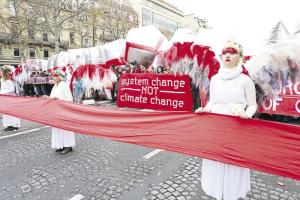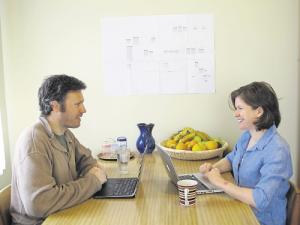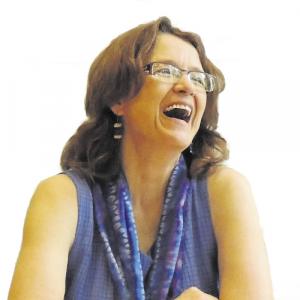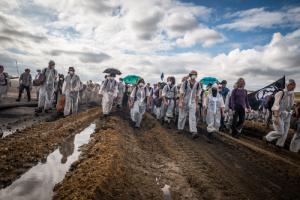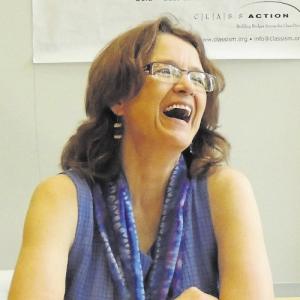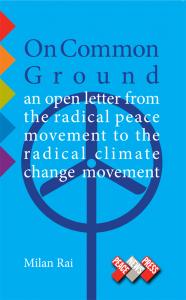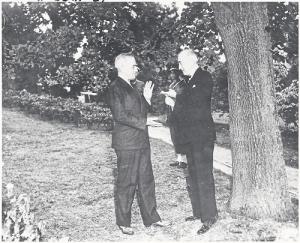On the five-day Time to Cycle bike ride to Paris in December, it turned out that one of our fellow riders was James Cracknell, who we’d published in the last issue writing very pessimistically about the climate talks.
James sat at our dinner table and explained how, if he was to re-write that article, it would be different because he felt more enthused after riding for two days with 125 other climate activists. His understanding of the facts would be…
Rai, Milan
Rai, Milan
Milan Rai
Friday started in an airy industrial squat just outside central Paris, with two men arguing whether the type of tear gas used by the French police has ever been implicated in the deaths of protesters.
The people being trained to form a human barricade practiced linking our arms through backpack straps (see p20), locking our legs together when sitting down, ducking our heads to minimise the…
About three years ago, two Australian campaigners were surprised and frustrated to discover that the next generation of student activists were making the very same mistakes in organising that they had made at university. Nothing seemed to have changed. A lot of people have had a similar realisation.
Unlike a lot of people, however, Keira Paterson and Sky Christensen decided to do something about it. ‘Sky had this…
I first came across Betsy Leondar-Wright through her book, Class Matters: Cross-Class Alliance Building for Middle-Class Activists (New Society Publishers, 2005). An intriguing subtitle! In conversation with her, over Skype, I found out more about how that wonderful book came to be.
Betsy was then working at United for a Fair Economy (UFE) a US NGO based in Boston, Massachusetts. (‘United for a Fair Economy challenges the concentration of wealth…
Like global climate change group 350.org, we all need to look beyond the Paris climate talks and whatever protests we manage to organise there to the building of mass civil disobedience for climate justice in 2016. 350.org is talking about an escalation in May 2016.
Whatever comes out of the COP21 negotiations in December,…
Noam Chomsky once observed that the dirty little secret of ‘national security policy’ is that ‘security is at most a marginal concern of security planners’. He was speaking of the United States, but the lesson generalises, certainly to the UK.
We can see this in the reaction to the ‘Islamic State’ terror attacks in Paris in November, which killed 130 people.
Policymakers in Britain, France and elsewhere are knowingly increasing the power of IS recruiters and commanders…
The climate negotiations in Paris in December are shaping up to be an orgy of self-congratulation for the great powers, as they trumpet pledges to reduce their carbon emissions. There's a real risk that an inadequate - and non-binding - deal will nevertheless be represented as ʻsolvingʼ the problem of climate change.
Thereʼs an ominous parallel here with the 'Make Poverty History' campaign…
Do you want to be part of a rising movement for climate justice and a Just Transition to a decarbonised economy? The UN summit on climate change (COP21) is coming to Paris in December and mobilisations are gaining momentum.
PN is…
Betsy Leondar-Wright, the programme director of Class Action on the south side of Boston, is a bright-eyed, sparkling, high-energy interviewee. She speaks faster than anyone I’ve ever had to transcribe before, and laughs throughout our 90 minutes on Skype, despite talking about some pretty challenging issues. She is candid about her own past shortcomings, and respectful to people she has disagreed with.
I can’t imagine anyone not liking her.
Betsy is especially excited…
On Saturday 12 September, we had a wonderful ideas day in London with 18 PN workers, readers and supporters, thinking about how Peace News can develop and grow and become more useful to the cause of nonviolence and to grassroots movements struggling for radical social change.
More power than we know
One of the interesting moments came at the beginning of the day, when we considered the question ‘When have I felt powerful?’ The answers to this were meant…
The British defence secretary has given up on ‘innocent until proven guilty by a jury of peers’, and introduced a new legal principle: ‘innocent until the government believes you are likely to commit a crime’.
In an interview on Radio 4’s Today programme on 8 September 2015, Michael Fallon justified the killing by a British drone of two British citizens (Reyaad Khan and Ruhul Amin), and another unidentified man, by referring three times to the risk of a ‘likely’ terrorist…
The real story of the Iran nuclear deal is that, after over a decade of denial, the United States finally gave up on its attempt to stop Iran enriching uranium. This isn’t how the mainstream media in the Global North portrayed the agreement, but it’s the heart of the matter.
We can see this clearly if we look back at the history of Iranian offers and US rejections over the last 13 years. The US could have had a deal in…
How can we create a genuinely common agenda for the climate movement and the disarmament movement? It’s easy – and still important – to say that the money we spend on nuclear weapons could be spent on preventing climate change, but there must be more than that.
For us in the peace movement, it can be hard sometimes to see that climate change is already a reality today, it’s not just about what might happen two generations from now. We’re already seeing the impact of climate change…
The British broadsheets varied in their scepticism about July’s US-led nuclear agreement with Iran – from the Financial Times and the Guardian (who respectively welcomed ‘a breakthrough’ and ‘a triumph’ for diplomacy’) through to the Times, which warned of ‘A Reckless Gamble’.
In another demonstration of the accuracy of Noam Chomsky and Edward Herman’s Propaganda Model of the mainstream media, the ‘quality papers’…
Many people justify the destruction of the Japanese cities of Hiroshima and Nagasaki 70 years ago. Though brutal and indiscriminate, many people believe the atomic bombings shortened the Pacific war, and reduced the total number of lives lost.
In fact, there is a strong case that the US determination to use the bomb lengthened the war.
It is…


